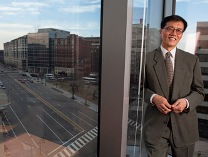
Typical street scene in Santa Ana, El Salvador. (Photo: iStock)
IMF Survey : IMF to Strengthen its Standing in Region, says new Asia Head
February 24, 2014
- Ties between new Asia dept head and IMF forged during Asian financial crisis
- IMF can learn from experience of development in Asia and Pacific, says Rhee
- Financial market stability, a key priority for region in coming months
The IMF should be like a family doctor who has an ongoing, close relationship with the patient, and not an emergency physician who appears only at times of crisis, suggests the new Director of the IMF’s Asia and Pacific Department.

“The IMF is uniquely placed to exchange expertise and information across economies at different stages of development,” says Rhee (Photo: IMF)
NEW HEAD OF ASIA AND PACIFIC DEPT
Speaking to IMF Survey just days after taking up his new position, Changyong Rhee—formerly Chief Economist with the Asian Development Bank—outlined his priorities and the prospects for the region.
IMF Survey: What made you decide to join the IMF?
Rhee: The IMF had a major impact on my career during the Asian financial crisis of the late 1990s. I was in academia at the time and consulted with the Korean government on negotiating the IMF program.
The experience of the crisis—the first-hand impressions of the severe problems faced by so many economies in the region—made me shift my research focus away from general macroeconomic questions and toward country-specific issues with direct policy implications.
From that point on, I became more actively engaged in policy, government consultations, and in working closely with IMF staff—those who regularly visited Korea as well as more broadly across several departments at Fund headquarters in Washington. Over time, the Fund has become very familiar to me and moving here was a natural choice.
IMF Survey: What will be your main goals as head of the IMF’s Asia and Pacific Department?
I have three main priorities. First, I want to contribute toward enhancing the IMF’s reputation in Asia. Relations between Asia and the IMF have improved greatly since the 1997 Asian financial crisis. Many policymakers in the region appreciate the Fund’s policy advice and technical expertise.
But there are still some in Asia who regard the IMF as an emergency doctor aiding a patient only during a crisis. I would prefer the Fund to be seen as a family doctor who provides ongoing care and candid advice based on a deep understanding of the patient’s history.
Second, I want to increase our efforts on technical training and capacity building. Asia and the Pacific is a very diverse region that includes many low-income and middle-income countries. From the IMF’s point of view, macroeconomic and financial stability are major goals. Of course, those aims are important, but for low- and middle-income countries the real question is: how to grow and develop in a sustained manner?
In this regard, I believe capacity building should be targeted at those government officers who will be in charge of implementing policies.
I also feel the IMF is uniquely placed to exchange expertise and information across economies at different stages of development. We can learn a great deal from local economists and government agencies across the Asia-Pacific region.
Many Asian economies have recently experienced the transition to middle- and high-income status. There is living memory of the process in the region, unlike in advanced economies that underwent this transition a hundred or more years ago.
I think we could be even more open to listening to the views from Asia and the Pacific, and to bringing their voices into our work with other emerging economies just embarking on the process of catch-up.
The third priority I want to emphasize is that the financial sector in many Asian countries is less developed than the real economy. So, I want to enhance our focus on financial infrastructure issues—interbank markets; the need to develop new capital markets; settlement issues; and clearing issues. This infrastructure will be critical to ensure that Asia’s financial systems provide effective support for the growth of the real economy in the decades ahead.
IMF Survey: What do you see as the most pressing economic issues for Asia?
Rhee: I think a critical short-term issue is the need to maintain financial stability in Asia, especially given the unwinding of quantitative easing and ongoing global uncertainty, combined with the slowdown in large emerging economies.
Another important issue is how to maintain dynamism in Asia. While the region continues to be the global growth leader, it faces structural constraints which vary across economies—aging, infrastructure deficits, inequality—as well as challenges related to governance and institutional capacity.
IMF Survey: Could you explain a little about yourself, your background, and your interests outside of work?
Rhee: I would describe myself as an economist with a deep interest in applying economic theory to the real world.
In addition to my academic career and my time at the Asian Development Bank as Chief Economist, I have held various high-level government positions in Korea including as Secretary General and Sherpa of the Presidential Committee for the G-20 Seoul Summit which took place in 2010.
Outside of work, I'm interested in sports. I used to be a very avid basketball, volleyball and tennis player, and even though I injured my knees and can’t play a lot of sports any more, I now enjoy playing golf and swimming. My golf handicap is ten!


